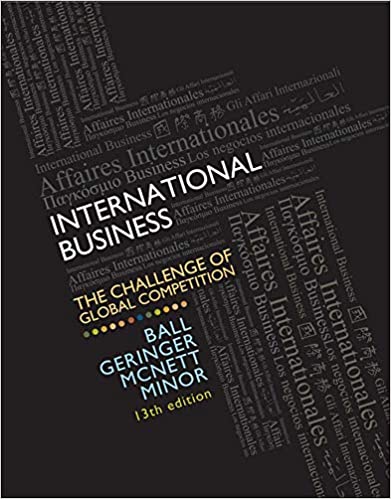
International Business 13th Edition by Donald Ball,Michael Geringer,Michael Minor ,Jeanne McNett
Edition 13ISBN: 978-0077606121
International Business 13th Edition by Donald Ball,Michael Geringer,Michael Minor ,Jeanne McNett
Edition 13ISBN: 978-0077606121 Exercise 3
The Ethics of Exporting: Do Home Values Apply?
In early 2011, Australia banned the export of Australian cattle to Indonesia after reliable reports of cruelty in Indonesian slaughterhouses came to the attention of the Queensland government. At first glance, this action sounds like a responsible commitment to the humane treatment of animals.
Yet there is a dilemma or two here because there are beef ranchers in Queensland who depend totally on the live export market for their sales. And Indonesia is a huge market for them. One-third of the meat eaten in Indonesia is Australian beef.
In addition, as a result of the ban, there is less food for the 40 million Indonesians who live below the poverty line. "Ah, but they probably don't eat imported beef," you may be thinking. That's true, but when there's less food in the system, the poor will feel the effects first.
Other ethical issues related to exporting also touch on whether the home-country ethics should be upheld for the exports. Should the United Kingdom, which has outlawed the death penalty, export execution drugs to the United States? Should quality standards thought appropriate for the domestic market be maintained for the export markets in areas such as pharmaceuticals?
These issues about the ethics of exporting are the question here. To what degree are ethics domestic and to what degree are they universal? Another way to phrase the question is, Should exports have ethics embedded in them? What do you think?
In early 2011, Australia banned the export of Australian cattle to Indonesia after reliable reports of cruelty in Indonesian slaughterhouses came to the attention of the Queensland government. At first glance, this action sounds like a responsible commitment to the humane treatment of animals.
Yet there is a dilemma or two here because there are beef ranchers in Queensland who depend totally on the live export market for their sales. And Indonesia is a huge market for them. One-third of the meat eaten in Indonesia is Australian beef.
In addition, as a result of the ban, there is less food for the 40 million Indonesians who live below the poverty line. "Ah, but they probably don't eat imported beef," you may be thinking. That's true, but when there's less food in the system, the poor will feel the effects first.
Other ethical issues related to exporting also touch on whether the home-country ethics should be upheld for the exports. Should the United Kingdom, which has outlawed the death penalty, export execution drugs to the United States? Should quality standards thought appropriate for the domestic market be maintained for the export markets in areas such as pharmaceuticals?
These issues about the ethics of exporting are the question here. To what degree are ethics domestic and to what degree are they universal? Another way to phrase the question is, Should exports have ethics embedded in them? What do you think?
Explanation
Case Summary: A, banned the export of ca...
International Business 13th Edition by Donald Ball,Michael Geringer,Michael Minor ,Jeanne McNett
Why don’t you like this exercise?
Other Minimum 8 character and maximum 255 character
Character 255


